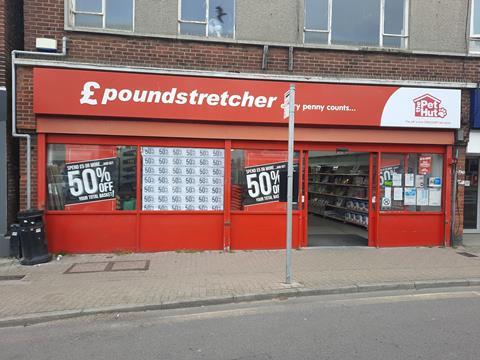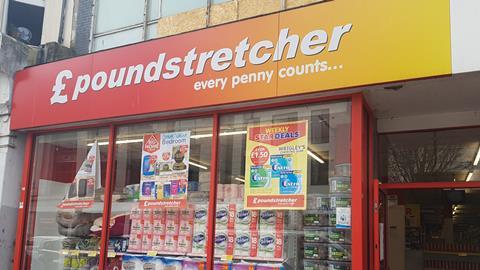After a ‘choppy’ few years of restructuring, store closures, and multiple CEOs, can Majestic Wine owner Fortress steady the Poundstretcher ship?
Fortress, the US investment firm that turned around Majestic Wine and was outbid for Morrisons by Clayton Dubilier & Rice, has a new challenge on its hands, having last week acquired Poundstretcher.
Out goes Poundstretcher owner Aziz Tayub, into retirement, having controlled the chain since 2008. In comes former Morrisons group commercial director Andy Atkinson as Poundstretcher CEO, while former Morrisons operating and finance chief Trevor Strain will join the board in a non-executive capacity once the transaction completes.
Tristan Phillips, who was appointed Poundstretcher CEO last year, will resume his former role as chief financial officer.
So what is in store for the new management? And for Poundstretcher and its staff?
The past few years have been a “very choppy period” for Poundstretcher, notes Shore Capital’s Clive Black.
The retailer made a loss before tax of £230,000 in its 2019 financial year, and a £45.3m loss in 2020.
In summer 2020, it entered a company voluntary arrangement – a cost-cutting restructuring process that saw loss-making stores close. It returned to an operating profit in 2021, of £88.3m, its estate having shrunk from 451 stores to 371 – still more than the 322 it has now. Its staff count had gone from just under 6,000 to just under 5,000. Again, more than the 4,000 now. Profit before tax dipped to £16.6m in 2022 and £13.5m in 2023.
There has also been churn in senior management. Atkinson will be Poundstretcher’s third CEO in two years. Before Phillips, Derek Lawlor had been in the post for 10 months.
Lawlor followed Burcu Kerpicci, who left Poundstretcher as COO in 2020 having lasted six months, and Somnath Saha, who was group commercial director for about a year up until late 2019. Before Saha, Poundworld founder Chris Edwards lasted about six months as Poundstretcher CEO, leaving in 2018.
Idiosyncrasies
It gave Edwards intimate knowledge of the idiosyncrasies of the business. “They had the thickest stock sheets you’ve ever seen, and I picked 50 items that they’d had for longer than two years to put in a January sale,” he tells The Grocer.
“The first thing I picked was coffee tables, and they said: ‘There’s a problem with those. They’ve got no legs.’”
“Of the 50 items, it turned out they didn’t have any. But maybe the people taking over have made sure they’ve got the stock they think they’ve got.”
Edwards also grappled with an inconsistent range. “If you’re going to build up regular business, even in a discounter, you’ve got buy a certain shampoo, or whatever it is, so people want to come back. But the hit and miss of Poundstretcher’s items means they don’t have continuity on the shelves.”
Neither is Edwards impressed with the operation now. Having founded variety discounter One Beyond in 2019 with his son, Chris Edwards Jr, and grown the chain to 120 stores, Edwards Sr still visits Poundstretcher’s shops to check the competition.
“They have minimum staff. They don’t put security guards on. It’s a very bad operation in my opinion,” he says.
“If we’re going to open next to a B&M or Poundland, we have to think it through first. If it’s Poundstretcher, we don’t give it a thought because we class them as useless.”
Read more:
-
Poundstretcher sold to Fortress Investment Group
-
Majestic completes acquisition of Vagabond Wines
-
Out of the ashes: Why pre-pack deals have left drinks suppliers raging
Retail analyst Nick Bubb concurs that in a crowded discounter market, Fortress has not acquired a “licence to print money”.
However, it has an eye for untapped potential. “They are looking at value plays,” says Black. “Majestic was in a troubled wine sector.”
Fortress acquired Majestic Wine in 2019, freeing its former owner to focus on the online Naked Wines business, where it saw growth potential.
Majestic opened two stores in a week in October last year – for the first time in a decade – and subsequently reported its ‘best ever’ Christmas, with sales rising by 8.1% in the eight weeks to 25 December.
Earlier this month it even completed an acquisition, of the Vagabond Wines brand and nine stores from administrators.
“Fortress has been highly engaged and taken a proactive approach to growing Majestic,” says a drinks supplier source.
Punch Pubs, which Fortress acquired in 2021, is also on the acquisition trail. The 1,300-strong pub chain last month bought three pubs from Steamin’ Billy and said it had a strong pipeline of more acquisitions ahead. The chain reported a “strong” performance in its quarter to 3 December, with underlying EBITDA of £25.6m, up from £23.9m year on year.
David Sables, CEO at Sentinel Management Consultants, says: “Fortress are putting their money into British consumer-facing businesses where they think they can grow value and almost certainly then sell off or IPO.”
Black says: “Fortress is a really serious new owner for Poundstretcher and the bargain arena would do well to not misjudge its capabilities.”

In Trevor Strain, who departed Morrisons in 2022 following the CD&R takeover, Fortress has secured a “world-class” appointment, Black says.
“Trevor did for Morrisons in 2014 what Dave Lewis did for Tesco. He saved the business as interim CEO at the time.”
Edwards stresses the need for discounter experience. When he sold Poundworld to TPG Capital in 2015 – three years ahead of the chain’s collapse – area managers were replaced with recruits from Morrisons. “And let me tell you, Morrisons area managers are not the people to run a discount store.
“In the discount world, you need to have ground floor knowledge. You have to be co-ordinated. You’ve got to be buying at the right price.”
It doesn’t worry Black. New Morrisons CEO Andy Atkinson “has a lot of experience in proprietary brands and understands supply chains”, he says.
However, both Black and Edwards agree an immediate challenge will be addressing a haphazard assortment, albeit one with a good level of category management, including pet and seasonal gardening.
“It’s now for this new management team to work out what it should sell, what it shouldn’t, how they evolve the supply chain,” says Black.
They also need to improve the brand’s image and store standards. “If we put B&M, The Range, Poundland, Aldi, Lidl, Savers and Home Bargains in a league table, I imagine Poundstretcher would come bottom,” Black adds.
But the potential is there. “They don’t have to open stores. It’s about self-improvement. There is territory to go for over the next three to five years.”
In the meantime – just as long as the new team can address challenges quickly enough – the Fortress takeover should be seen as “fabulous news” for Poundstretcher’s employees and customers, says Black.

He’s responsible for covering the discounters and retail property, and for commissioning and editing The Grocer’s analysis features. He has over 20 years' experience as a journalist, during which his by line has appeared regularly in a range of national newspapers.
Follow Steve on Twitter: @Steve_Farrell_ View full Profile
























No comments yet